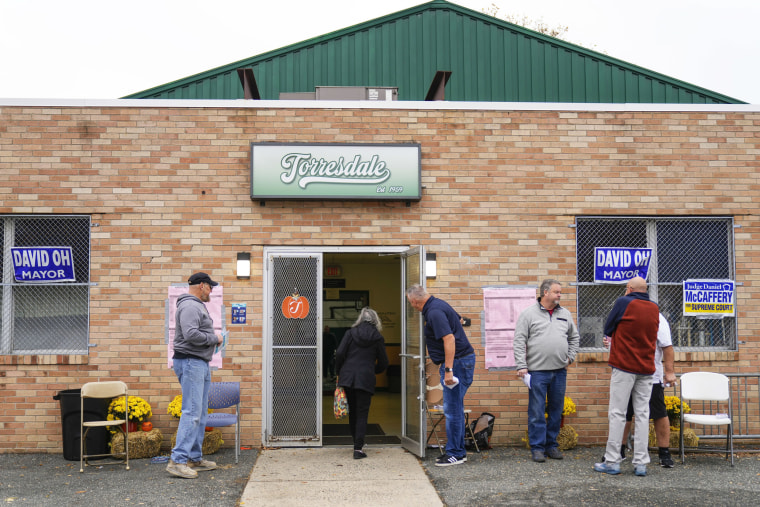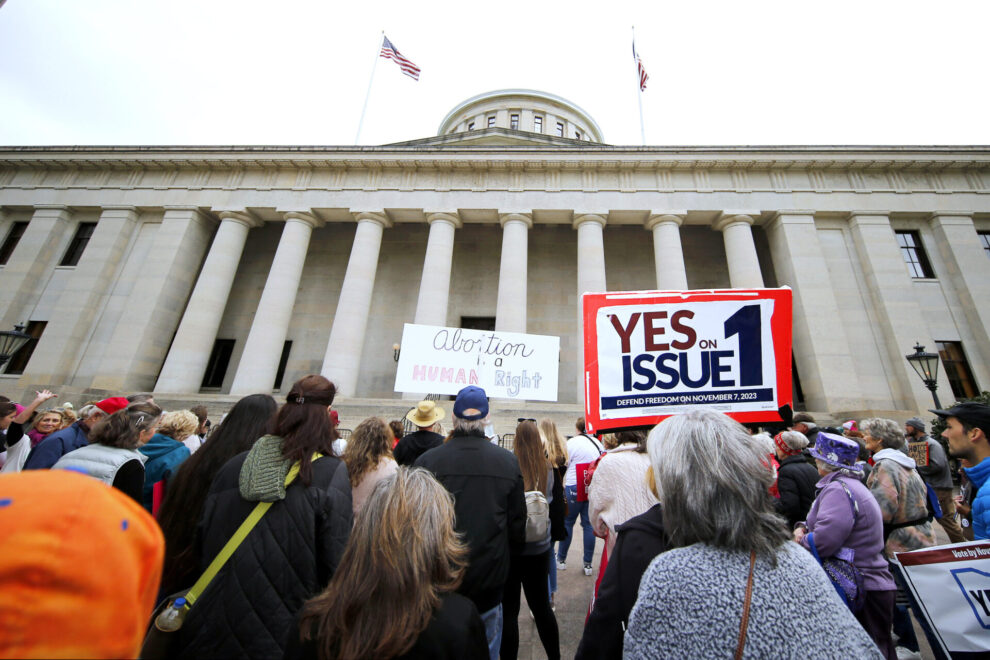After Democratic wins in Virginia, both parties chart paths forward through legislative elections across the country in 2024.
On election night 2010, Jessica Post, then a junior staffer at the Democratic Legislative Leadership Committee, watched as Republicans won over 680 state legislative seats across the country and flipped 22 state legislative chambers.
Two years later, she watched Republicans make more inroads, even as former President Barack Obama claimed a second term. And in 2014, “we went into, sort of, our all-time low,” Post said.
But this month, Post, who was the president of the DLCC from 2016 through 2020, watched as Democrats held on to the state Senate and took back the state House in Virginia, ensuring the party’s voice in state government for the next two years — and kicking off a year of fights between Democrats and Republicans for control of state governments around the country in 2024.
According to the National Conference of State Legislatures, Republicans have total control of the legislatures in 28 states and Democrats have total control in 19. Two states have divided chambers, including Virginia for a few more weeks, while one, Nebraska, has a nonpartisan, unicameral legislature.
“2024 is the year of the states,” Post declared. “We had such success in 2022 and 2023. And such successful state legislative sessions in 2023 from these new Democratic trifectas [in Michigan and Minnesota]. Hopefully people realize that there is so much power and so much power has moved to the states.”
A new target map
Hoping to build on the committee’s recent success, the DLCC’s goals include not only flipping state legislatures and protecting existing majorities, but also trying to break GOP legislative supermajorities in states like Georgia, Kansas, North Carolina and Wisconsin next year.
Democrats are also keen to protect their existing majorities in the Minnesota House, the Michigan House and the Pennsylvania House while targeting both chambers of the GOP-controlled Arizona and New Hampshire legislatures, as well as the Pennsylvania Senate.
On the other side of the aisle, the GOP’s committee focusing on state legislative races hasn’t officially outlined its 2024 targets yet, but some of the majorities Democrats hope to protect are in some of the most closely divided state chambers in the country — natural targets for the GOP next year.
In Michigan’s state House, for example, Democrats have just a two-seat majority. And in the Pennsylvania House, Democrats have a one-seat majority over Republicans. In Arizona, one of the DLCC’s targets, Republicans have two-seat majorities in both chambers.
Democrats credit enthusiasm for protecting abortion rights as one reason for their wins in 2022 and 2023 — and they hope the issue will propel them next year, too.
“We realized that we had a winning strategy and that abortion was still very important issue to voters,” said Heather Williams, the DLCC’s interim president.
Still, one issue legislative candidates didn’t have to litigate in 2022 and 2023 was President Joe Biden’s deep unpopularity. Next year, though, he’ll be on the ballot with hundreds of legislative candidates across the country.
CONGRESSSenate Judiciary authorizes subpoenas of Harlan Crow and Leonard Leo in Supreme Court ethics probe
The latest NBC News national poll found Biden’s approval rating at 40% — the lowest level of his presidency.
Williams said that even though Biden wasn’t on the ballot in the last two years, he was still on voters’ minds.
“Sure, he wasn’t on the ticket, but there is no escaping — right? — like, the Democratic Party from Biden — like, he’s the leader of the party,” Williams said.
But, she added, state legislators’ involvement in the community helps voters form opinions about candidates that are distinct from their opinions about Biden.
“I will say something that we are seeing is that our level of the ballot — state legislators, right? — they are really still in these communities. They live there,” Williams said.
Both sides plan to take advantage of early voting
Despite Republican losses in the Virginia House and Senate this month, the DLCC’s opposite, the Republican State Legislative Committee, touted a new early and absentee voting strategy as something that will help it in legislative races around the country next year.
“I think Republicans have a blueprint for success heading into the 2024 cycle. One of our larger goals as we head into the 2024 cycle is really tackling the [absentee and early voting] gap and starting to chip away at the Democrats’ advantage on this front,” Max Docksey, the RSLC’s political director, told reporters this month.
Docksey added that after the 2022 midterm elections, “Democrats were highly effective at turning out low-propensity voters in battleground states across the country, including states like Pennsylvania and Michigan. By investing in low-propensity voters, the Democrats were not only increasing their [absentee and early vote] advantage, but they were actually expanding their base of voters overall.”

“This showed us that [absentee and early voting] needs to be treated as an additional campaign operation, not just a small component of the larger campaign plan,” Docksey said.
He also said the RSLC plans to continue encouraging absentee and early voting options in next year’s legislative races.
“We truly believe that as Republicans look ahead to the 2024 cycle, this is the absentee and early vote model that needs to be adopted across the country,” he said.
While Democrats retained an advantage among early and absentee voters in Virginia this year, they took notice of the GOP’s efforts.
Williams said: “As you move to 2024, the Republican voter is willing to accept and trust early, early in-person voting options, whether that’s satellite locations or extended hours or what have you. But … the trust of mail-in ballots is still questionable for the average Republican voter. So I think … that’s one of the things certainly that we’re, like, looking at.”
Source: NBC News















